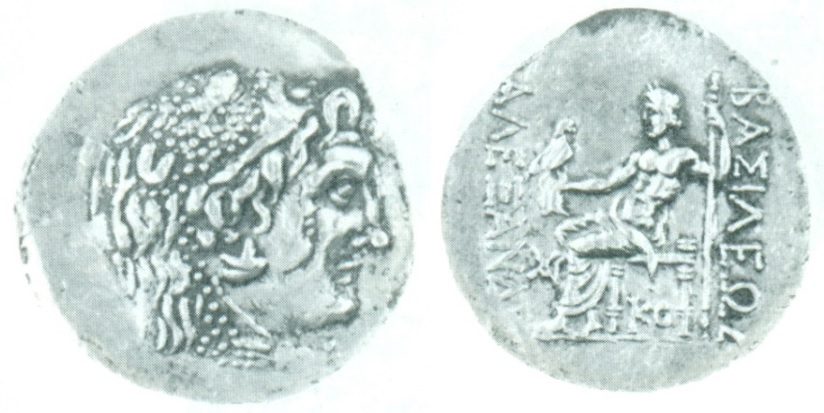110 BCE - 80 BCE | BAΣΙΛΕΩΣ AΛΕΞANΔΡΟΥ
Overstriking coin
Mesembria 794 New York.jpg
Overstruck variety
Macedonia First meris.jpg
Description
| ObverseInscription or printing placed on the obverse.:
|
Head of Herakles right, wearing lion skin headdress.
|
ReverseInscription or printing placed on the reverse.:
|
BAΣΙΛΕΩΣ AΛΕΞANΔΡΟΥ (Greek) Zeus enthroned left, holding eagle and scepter. Under the throne, ΑΛ. In left field, Corinthian crested helmet.
|
Mint and issuing power
| MintIdentifies the place of manufacture or issue of a numismatic object.:
|
Mesembria
|
Ancient regionAncient region.
|
Thrace
|
Modern countryModern country: Bulgaria
|
AuthorityIdentifies the issuing power. The authority can be "pretended" when the name or the portrait of X is on the coin but he/she was not the issuing power. It can also be "uncertain" when there is no mention of X on the coin but he/she was the issuing power according to the historical sources:
|
Alexander III the Great (Argead king, 336-323 BC)
|
Chronology
| FromIdentifies the initial date in a range assigned in a numismatic context. 110 BCE toIdentifies the final date in a range assigned in a numismatic context.. 80 BCE
|
hellenistic periodTime period of the numismatic object.
|
Physical description
MetalThe physical material (usually metal) from which an object is made.: Silver 
|
WeightWeight of the numismatic object (in grams). in grams: 16.4816.48 g <br />16,480 mg <br />
|
DenominationTerm indicating the value of a numismatic object. Examples: tetradrachm, chalkous, denarius.: tetradrachm 
|
AxisDescribes the directional relationship between the obverse and reverse of a numismatic object.: 1212 mm <br />1.2 cm <br />
|
| DiameterDescribes diameter of an object (in mm).: 35.535.5 mm <br />3.55 cm <br />
|
StandardStandard.: Attic
|
References
| Coin referenceReference of the Coin:
|
|
Coin series referenceReference to coin series study:
|
Price 19911Price 1991, n° 1029, Karayotov 19922Karayotov 1992, n° 333, Karayotov 19943Karayotov 1994, p. 107, n° 701 (O76-R256 monogram 82), Callataÿ 1994a4Callataÿ 1994a, p. 334, D28/R2a, Callataÿ 19975Callataÿ 1997, p. 102, D28/R2a, MacDonald 20096MacDonald 2009, p. 214, n° 16, Callataÿ 2021a7Callataÿ 2021a, p. 277, n° 20
|
Description
| ObverseInscription or printing placed on the obverse.:
|
(visible: small head of Artemis on the cheek of Herakles).
|
ReverseInscription or printing placed on the reverse.:
|
|
Mint and issuing power
Chronology
| FromIdentifies the initial date in a range assigned in a numismatic context. toIdentifies the final date in a range assigned in a numismatic context..
|
periodTime period of the numismatic object.
|
Physical description
| DenominationTerm indicating the value of a numismatic object. Examples: tetradrachm, chalkous, denarius. ᵖ:
|
tetradrachm 
|
StandardStandard. ᵖ:
|
Attic
|
References
References
- ^ Price, Martin Jessop (1991), The Coinage in the Name of Alexander the Great and Philip Arrhidaeus: a British Museum Catalogue, 2 vol., Zürich-London, 637 p., 637 p., clix pl.
- ^ Karayotov, Ivan (1992), Mонетосеченето на Mесамбрия, Спектър - АЛ, Burgas, 130 p.
- ^ Karayotov, Ivan (1994), The coinage of Mesambria. vol. 1: silver and gold coins of Mesambria, Centre of Underwater Archaeology, Sozopol, 134 p. and 44 pl.
- ^ Callataÿ 1994a
- ^ Callataÿ 1997
- ^ Macdonald, David (2009), Overstruck Greek coins: studies in Greek chronology and monetary theory, Whitman Publishing, Atlanta.
- ^ Callataÿ, François de (2021), “On pattern and purpose of overstrikes of late Hellenistic tetradrachms in Thrace Macedonia”, in Ulrike Peter and Bernhard Weisser (eds.), Thrace. Local coinage and regional identity, Berlin Studies of the Ancient World 77, Berlin, Topoi, p. 263-289.

